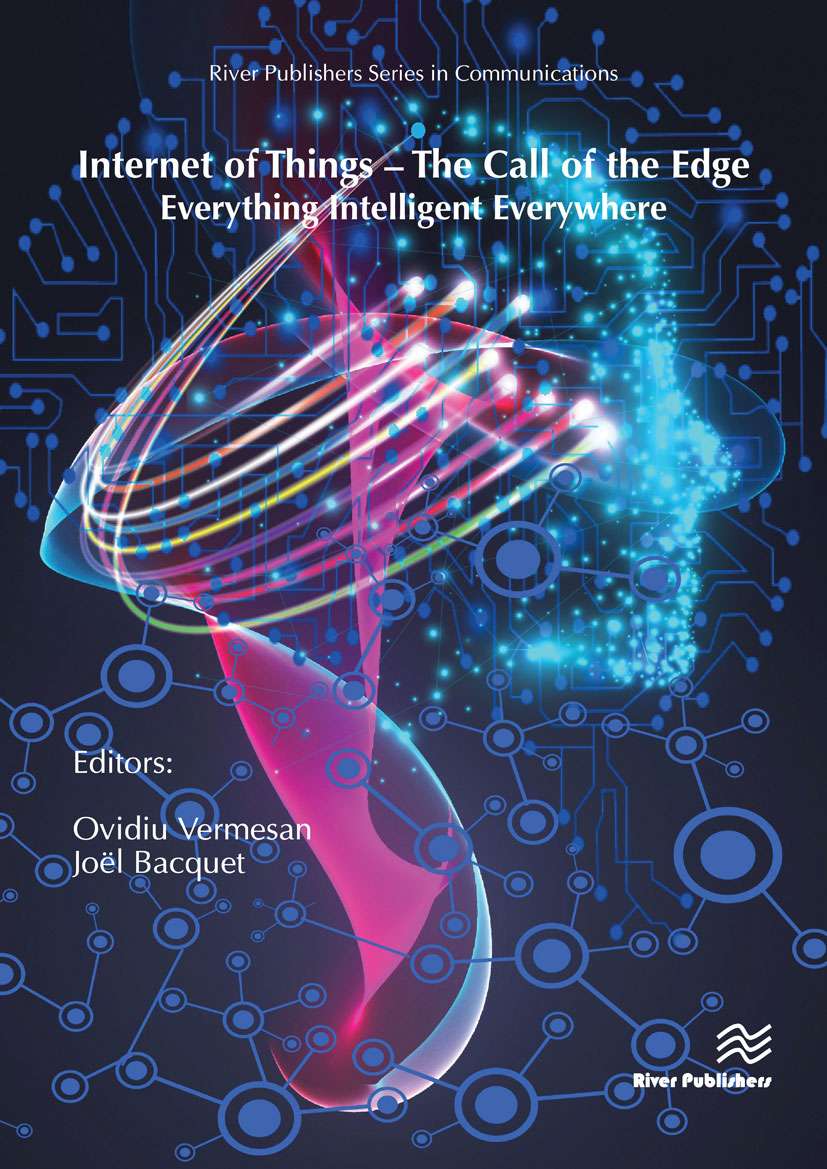Internet of Things - The Call of the Edge
Everything Intelligent Everywhere
Editors:
Ovidiu Vermesan, SINTEF, Norway
Joël Bacquet, EU, Belgium
The book chapters build on the developments and innovative ideas put forward by the IERC, the IoT European Large-Scale Pilots Programme and the IoT European Security and Privacy Projects - presenting new concepts, ideas and future IoT trends and ways of integrating open data frameworks and IoT marketplaces into larger deployment ecosystems.
The IoT and Industrial Internet of Things technologies are moving towards hyperautomated solutions - combining hyperconnectivity, artificial intelligence (AI), distributed ledger technologies and virtual/augmented extended reality, with edge computing and deep edge processing becoming an assertive factor across industries for implementing intelligent distributed computing resources and data to keep the efficient data exchange and processing local to reduce latency, exploit the sensing/actuating capabilities and enable greater autonomy.
Expanding the adoption of consumer, business, industrial and tactile IoT requires further development of hyperautomated IoT concepts for collaborative solutions involving machines and humans to expand augmented creativity at the application level using AI to optimise the industrial processes and progress towards a symbiotic economy based on distributed federated cloud/edge infrastructure allowing resource sharing in the form of computing, memory and analytics capabilities.
The advances of autonomous IoT applications delivering services in real-time encompasses development in servitisation, robotisation, automation and hyperconnectivity, which are essential for the rapid evolution of industrial enterprises in the new digital era. The rise of digital twins integrated into IoT platforms as fully interactive elements embedded into the simulation and optimisation environment, as well as the embedment of AI techniques and methods, enhances the accuracy and performance of models in the various IoT and Industrial Internet of Things applications.
The convergence of technologies to provide scalable, interoperable IoT-enabled applications pushed the requirements for high bandwidth, low latency and robust and dependable connectivity to support the industry's demand for deeper integration and improved analytics to deliver sustainable competitive advantage products and services, enabling digital transformation with a focus on new business models.
Safety and security are interlinked for the next wave of IoT technologies and applications and combined, prove a greater value for rapid adoption.
The new IoT technologies are essential for facilitating sustainable development, reducing energy consumption and, by supporting the optimisation of products and processes, mitigating unnecessary carbon emissions - thereby reducing the environmental impact through real-time data collection, analysis, exchange, and processing.
Chapter 1: The EU IoT Policy and Regulatory Strategy – the Way Forward
by Nikolaos Isaris
Chapter 2: Focus Area on Digitization Further Deployment of Digital Technologies in Industrial Sectors
by Joël Bacquet, Rolf Riemenschneider and PeterWintlev-Jensen
Chapter 3: New Waves of IoT Technologies Research – Transcending Intelligence and Senses at the Edge to Create Multi Experience Environments
by Ovidiu Vermesan, Marcello Coppola, Mario Diaz Nava,
Alessandro Capra, George Kornaros, Roy Bahr,
Emmanuel C. Darmois, Martin Serrano, Patrick Guillemin,
Konstantinos Loupos, Lazaros Karagiannidis
and Sean McGrath
Chapter 4: Real-time Management of Energy Consumption in Water Resource Recovery Facilities Using IoT Technologies
by Rita Alves, M´ario Nunes, Augusto Casaca, Pedro P´ovoa
and Jos´e Botelho
Chapter 5: IoT Solutions for Large Open-Air Events
by Francesco Sottile, Jacopo Foglietti, Claudio Pastrone,
Maurizio A. Spirito, Antonio Defina, Markus Eisenhauer,
Shreekantha Devasya, Arjen Schoneveld,
Nathalie Frey, Hors Pierre-Yves, Paolo Remagnino,
Mahdi Maktabdar Oghaz, Karim Haddad,
Charalampos S. Kouzinopoulos, Georgios Stavropoulos,
Patricio Munoz, S´ebastien Carra, Peeter Kool
and Peter Rosengren
Chapter 6: IoT Technologies for Connected and Automated Driving Applications
by Ovidiu Vermesan, Roy Bahr, Mariano Falcitelli, Daniele Brevi,
Ilaria Bosi, Anton Dekusar, Alexander Velizhev, Mahdi Ben Alaya,
Carlotta Firmani, Jean-Francois Simeon,
Louis Touko Tcheumadjeu, G¨urkan Solmaz, Francesco Bisconti,
Luca Di Mauro, Sandro Noto, Paolo Pagano, Enrico Ferrera,
Guido Alejandro Gavilanes Castillo, Edoardo Bonetto,
Vincenzo Di Massa, Xurxo Legaspi, Marcos Cabeza,
Diego Bernardez, Francisco Sanchez, Robert Kaul,
Bram Van den Ende, Antoine Schmeitz, Johan Scholliers,
Georgios Karagiannis, Jos den Ouden, Sven Jansen,
Herv´e Marcasuzaa and Floriane Schreiner
Chapter 7: IoT in Brazil: An Overview From the Edge Computing Perspective
by Marcelo Knorich Zuffo, Laisa Caroline Costa De Biase,
Pablo César Calcina-Ccori, Catherine Pancotto Portella,
Adilson Yuuji Hira, Gabriel Antonio Marão,
Irene Karaguilla Ficheman, Geovane Fedrecheski
and Roseli de Deus Lopes
Chapter 8: IoT Technologies and Applications in Tourism and Travel Industries
by M. Dolores Ordóñez, Andrea Gómez, Maurici Ruiz,
Juan Manuel Ortells, Hanna Niemi-Hugaerts, Carlos Juiz,
Antonio Jara and Tayrne Alexandra Butler
